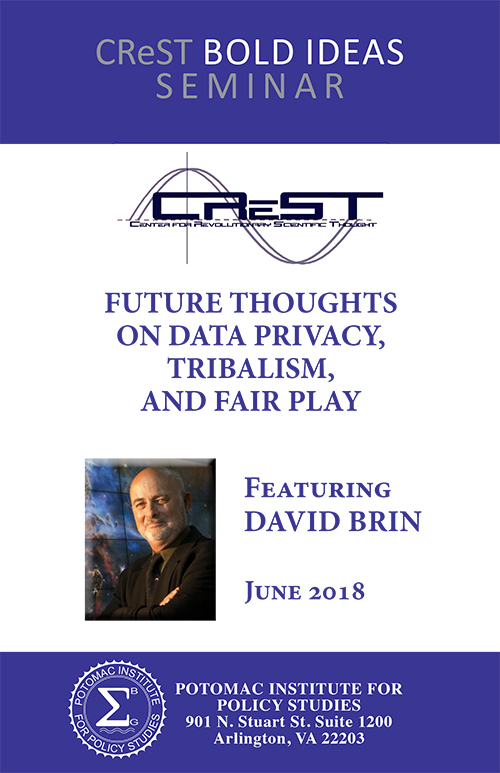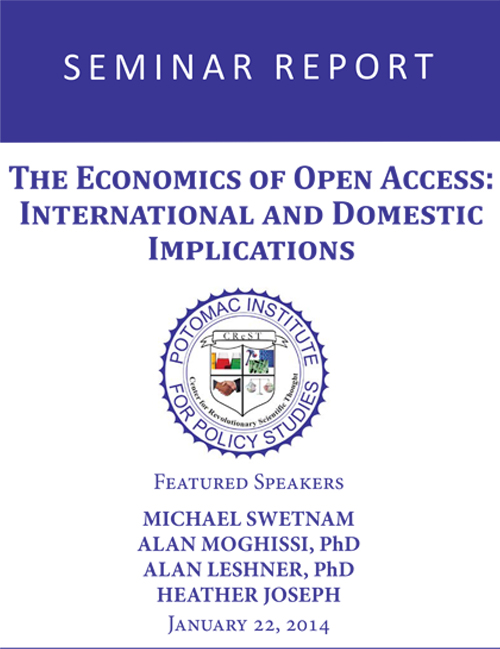Publications
Executive Summary:
Washington, DC - David Brin, a world-renowned science fiction author and futurist, spoke at the Potomac Institute as part of the CReST Bold Ideas seminar series. Dr. Brin brings a novel perspective when looking towards the future, and spoke on several topics of current debate including data privacy, tribalism, regulation and fair play. His writings on these topics, both essays and fiction, have been pivotal in shaping public discussions on transparency and individual rights. His wide-ranging discussion is summarized below.
Dr. Brin discussed his concepts of transparency and sousveillance- “watching the watcher” - as the solution to current debates over digital privacy rights. He argued that the only way to destroy cheating and ensure individual rights is to break up power by democratizing technology. As the pace of technology development accelerates, he argues that we should not try to constrain technology because elites will always be able to find loopholes to get around these constraints. He criticized the European approach to data privacy as paternalistic in structure and therefore insufficient to fully protect individual rights. These concepts are described in his seminal nonfiction book, The Transparent Society, his recent book Chasing Shadows, and in his essays and speeches.
Brin discussed his concept of disputation arenas, in which there are five accountability arenas (markets, science, democracy, justice courts, and sports). Brin embraces conflict and competition within certain bounds, and notes that, “across all of human history the only time we’ve ever gotten the benefits of competition has been regulated competition.” To Brin, a fairly regulated arena is responsible for harnessing creative competition, and that competition is the greatest creative force in the universe.
Brin also touched on Hollywood themes, tribalism in politics, great power competition with China, and the need for every individual to be a critical thinker and contrarian.
David Brin is a scientist, tech-pundit, forecaster, NASA adviser, and best-selling author. He is best-known for shining light — plausibly and entertainingly — on technology, society, and countless challenges confronting our rambunctious civilization. His best-selling novels include The Postman (filmed in 1997) plus explorations of our near-future in Earth and Existence. His short stories explore vividly speculative ideas. Brin's nonfiction book The Transparent Society won the American Library Association's Freedom of Speech Award for exploring 21st Century concerns about security, secrecy, accountability and privacy. As a scientist, tech-consultant and world-known author, he speaks, advises, and writes widely on topics from national defense and homeland security to astronomy and space exploration, SETI and nanotechnology, future/prediction, creativity, and philanthropy. Urban Developer Magazine named him one of four World's Best Futurists, and he was cited as one of the top 10 writers the AI elite follow. David Brin’s website: http://davidbrin.com/
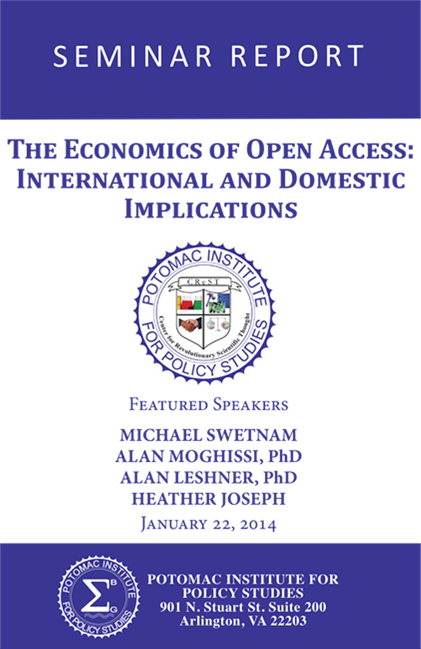 The Economics of Open Access: International and Domestic Implications
The Economics of Open Access: International and Domestic Implications
A discussion of one of the most fundamental issues surrounding science and technology – an issue important not just in the United States but, in fact around the world. That issue is access to research and science that is produced. Who owns what? What are the proprietary and publishing issues in an age of expanding technology? At its outset, it sounds like a simple question. Isn’t science something that belongs to all of us and shouldn’t access be open? But it turns out, as you will hear today and I am sure many of you know, it’s a very thorny issue. Science not only moves mankind forward in our understanding of the universe but it is also increasingly behind most economic development in the world. The question of access to science and ownership of science is very thorny, indeed. We want to discuss ways of recommending solutions to policymakers that are not just keeping science moving forward and incentivizing business, but are also incentivizing the population to continue to support and fund science. This goal is not just critical to our economy but in fact to the continued advancement of the human race. This, I believe, is one of the most important issues of our time and we are very proud that we are hosting a forum for this discussion. I would love to be able to say that, coming out of this forum, we will be able to write a document with defini- tive recommendations for our policymakers. Unfortunately, that will not happen today, but at least we can say that we’re contributing to the discussion and hopefully contributing to the ideas that will help policymakers work through this issue.
See the full report here
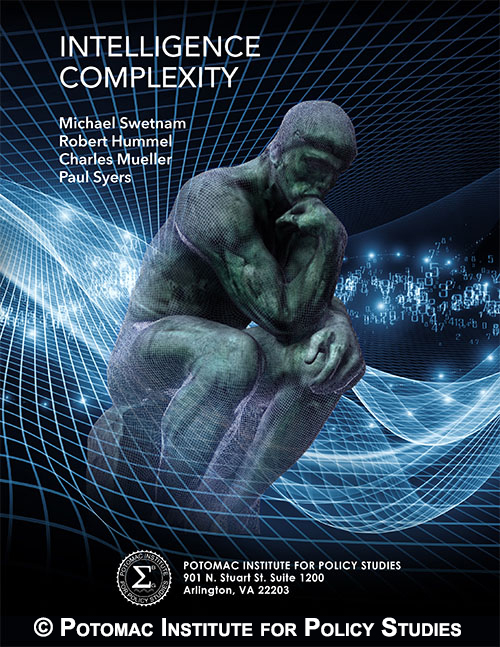 Intelligence Complexity details a theory of intelligence complexity based on discrete levels of intelligence: Data, Information, Knowledge and Wisdom (DIKW). The report provides detailed descriptions of each of these defined levels of intelligence and puts forward a framework that can be used to measure the intelligence complexity of any intelligent system. Intelligence Complexity’s DIKW framework provides an alternative to the Turing Test as a measure of a system’s ability to reach defined levels of intelligence.
Intelligence Complexity details a theory of intelligence complexity based on discrete levels of intelligence: Data, Information, Knowledge and Wisdom (DIKW). The report provides detailed descriptions of each of these defined levels of intelligence and puts forward a framework that can be used to measure the intelligence complexity of any intelligent system. Intelligence Complexity’s DIKW framework provides an alternative to the Turing Test as a measure of a system’s ability to reach defined levels of intelligence.
Intelligence Complexity also introduces a new concept (I = E x C) developed by author Michael Swetnam to explain what drives intelligent systems to learn. This theory posits that intelligence is inextricably linked to emotion, which is a key force that drives the development of human intelligence forward. The authors present a thermodynamic argument of emotion that attempts to explain the human intelligence system in terms of complexity, efficiency and entropy.
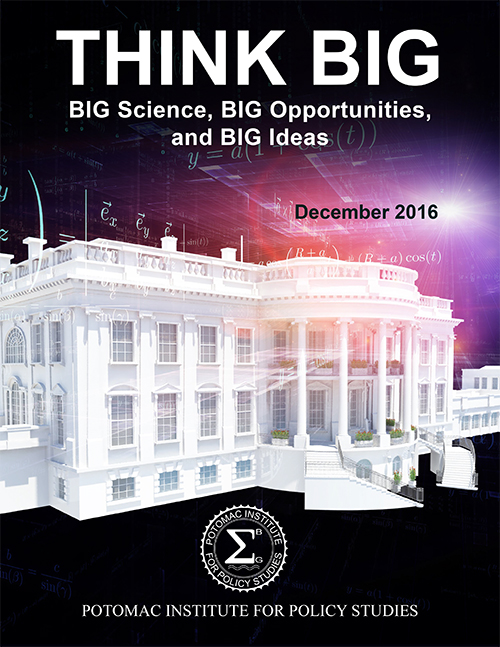 THINK BIG argues that innovation in science and technology are the keys to American economic strength and national security. Rather than a return to the infrastructure, economy, and healthcare systems of the past, the report calls for a vision for the future.
THINK BIG argues that innovation in science and technology are the keys to American economic strength and national security. Rather than a return to the infrastructure, economy, and healthcare systems of the past, the report calls for a vision for the future.
The report urges the new Administration to 1) develop policy based on the best available science and 2) use policy to foster the development of science and technology. The science and technology investment priorities identified in the THINK BIG report for the next Administration include:
· America’s Future Infrastructure
· Fostering American Industry Leadership
· Revolutionizing Medicine
· Climate Engineering
Download the full PDF here.
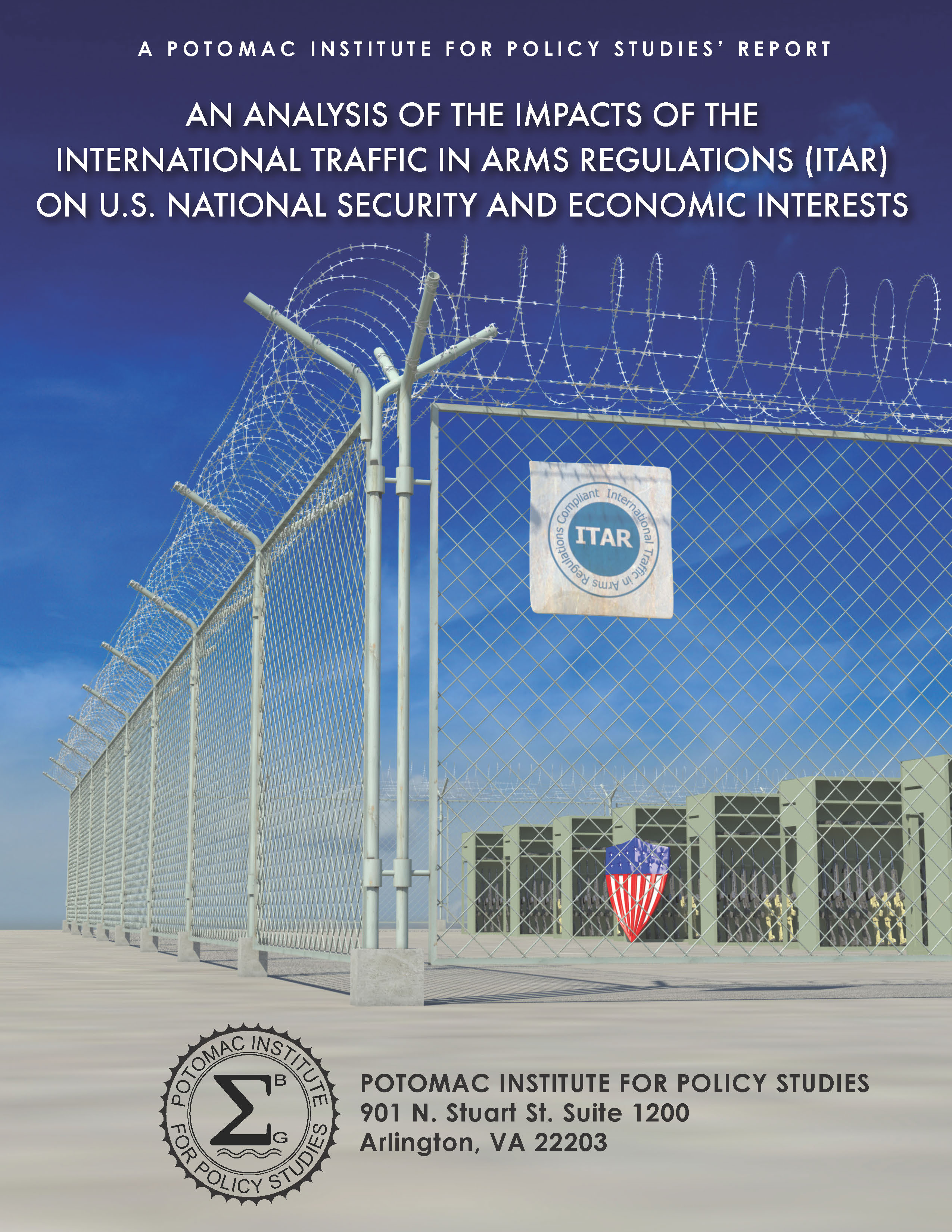 The International Traffic in Arms Regulations (ITAR), the set of regulations that limit U.S. exports in the name of national security, need to be rescinded with new enabling legislation because they continue to be a threat to the United States (U.S.) national security and economic interests despite a well-intended Executive reform initiative that has taken place over the last seven years.
The International Traffic in Arms Regulations (ITAR), the set of regulations that limit U.S. exports in the name of national security, need to be rescinded with new enabling legislation because they continue to be a threat to the United States (U.S.) national security and economic interests despite a well-intended Executive reform initiative that has taken place over the last seven years.
The Potomac Institute has followed and actively engaged in the decades of debate surrounding U.S. export control rules and laws. The Institute noted in 2009 that the Executive Branch began its Export Control Reform (ECR) Initiative to address the many concerns of various stakeholders, such as those highlighted in a 2009 National Academy of Sciences (NAS) report that examined the impacts of these rules and laws.12In 2015, the Institute opened a center focused on using science to improve regulations and regulatory policies –the Regulatory Science & Engineering Center (RSEC). One of its first studies was following up on the current reform initiatives taking place regarding the ITAR and determining what kinds of impacts the ITAR were still having on national security and economic interest related to science & technology (S&T).

